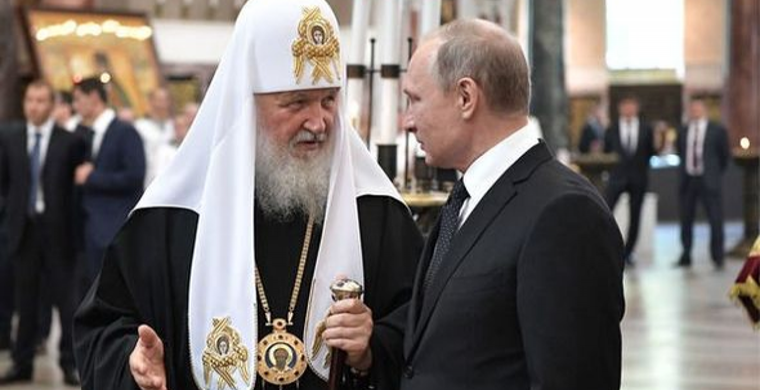New Russian Law Targets Christians in New Acts of Oppression
By Piotr Soloviev
Special to VIRTUEONLINE
www.virtueonline.org
November 26, 2019
A new Russian law known as the Yarovaya Law targets believers, and is designed to oppress Christians in the name of "extremism".
Among its most controversial provisions, the law increases security agencies' access to private communications, requiring telecom companies to store all telephone conversations, text messages, videos, and picture messages for six months and make this data available to authorities.
But the law also puts more restrictions on religious groups' activities in the name of fighting "extremism," a term that rights activists have long complained is so broad and ill-defined that any manner of dissent or unsanctioned protest could be criminalized.
For religious groups, the new law requires people to get official permits through a registered religious group and bars things like prayer meetings from taking place anywhere except for officially recognized religious buildings. That would potentially forbid house churches.
Members of a religious group would also potentially be barred from e-mailing invitations to people interested in services, according to Christianity Today, a web-based news service focused on religious issues.
Violators could be fined, or potentially expelled from Russia.
The Slavic Legal Center, in cooperation with the Institute of Europe of the Russian Academy of Sciences, conducted a study of all the cases that have resulted from the "Yarovaya Law" over the past two years, and found that this law did not deal with religious extremists, let alone terrorists, instead it harshly regulated the actions of the most innocuous of believers.
The authors of the study shared some of their findings with Ogonyok, and the picture they paint is troubling.
The following actions have taken place:
In Noyabrsk, a major city in the Yamal-Nenets Autonomous Region, pastors from the Union of Evangelical Christian-Baptists were fined for building a children's playground near the House of Prayer, because the police found religious literature inside the church, and they claimed that the children could be subjected to "illegal missionary activity" by reading these books.
In the Ivanovo region, a husband and wife prayed together before eating while out to dinner with friends. Their prayer was considered an "illegal missionary activity," and the couple were declared an "unregistered religious group."
In Biysk, several Seventh-day Adventists visited the local administration building to present their ministry activities, but the administration claimed this was an "illegal missionary activity" and sued them.
Recently a Jehovah's Witness was sentenced to 6 years in prison.
"There are practically no Protestants that haven't been impacted by the law," said the pastor of a registered Protestant church in Moscow who chose to remain anonymous. "I lead a congregation of 50 people, and almost every Sunday a police squad interrupts our services. They always ask us the same questions: 'Where are your registration documents? What do you do here? Where do you get the money to pay your rent? Why are you selling books? Do you have any new congregants?' After we talk with them, representatives from the Ministry of Internal Affairs inspect our books to make sure they have our church's full name written on them, as required by the law. If they don't find anything wrong, then they just come back the next week. Sometimes, local authorities dress up like civilians and knock on our door, asking to be let in so they can 'pray.' If we don't let them in, they film us turning them away and then use the footage against us. And if we do let them in, then they take pictures inside the church to identify ways that we are violating the 'Yarovaya Law.' We have had to pay several fines for 'illegal missionary activity.'"
"It is deeply ironic that while visiting Moscow to receive the prestigious Patriarch Alexy II Prize, His Beatitude Theophilos III, Patriarch of Jerusalem, met with President Vladimir Putin to discuss the condition of the Christians of the Holy Land and praised the Russian leader for his commitment to the Church in the Holy Land. In particular, Patriarch Theophilos praised the President for his crucial and generous assistance in the restoration of the Church of the Basilica of the Nativity; a holy place that every year receives thousands of Christian pilgrims from around the world."
Both the Baptists and the Orthodox recently issued a joint statement saying that they both agree on matters of morality. However, even elements within the Orthodox Church are alarmed by the Yarovaya Law, according to a report in the Moscow Bible Seminary
The Russian Union of Evangelical Christians-Baptists includes 1,800 churches with about 72,400 members. Although strictly speaking only 35 million of the 142 million inhabitants of Russia are members of the Orthodox Church, about 100 million consider themselves Orthodox, because they equate their nationality with their religion.
Putin is currently working at cutting Russia off from the worldwide internet, which would effectively cut Russian Christians off from the West.
President Putin seems anxious to please Russian Orthodox leaders, and happy to oppress other, mostly Protestant Christian groups, in his country for political gain.
Owing to the content of this story the author's name is being withheld.
END














